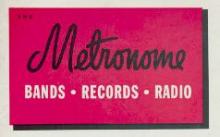
Barry Ulanov (1918-2000), a leading mid-century intellectual, was also a path breaker in serious writing about jazz. Ulanov became the editor of Metronome magazine in 1943 and transformed it from a struggling classical journal into a leading forum for contemporary issues in jazz. His thoughtful exploration of racial issues in jazz anticipated much later work on the subject. Yet Ulanov is perhaps best known as an early champion, along with Leonard Feather, of the then-controversial style of bebop represented by Charlie Parker, Dizzy Gillespie and Lennie Tristano. Metronome’s editors led the “progressives” in the charge against the traditionalist “moldy figs,” leading to strident polemics from both sides. Whereas the traditionalists believed that only New Orleans Jazz was authentic, the progressives believed that jazz should continuously change and incorporate influences from other forms of music and culture. In 1947, Ulanov recruited Parker, Tristano and other leading bebop musicians for the Metronome All-Stars, which joined a battle of the bands against a traditionalist group on NBC Radio that was preserved in some fine live and studio recordings. Ulanov was the author of the first biography of Duke Ellington (1946), which balanced his scholarly interests with biographical data of interest to musicians and fans. He also wrote a biography of Bing Crosby (1948) and two overviews of jazz history (1952 and 1957). Ulanov’s interests and achievements ranged far beyond music. He studied anthropology in college (choosing Columbia rather than at Harvard in order to be closer to Harlem), then earned his PhD in English literature at Columbia in 1955. Ulanov went on to teach English at Princeton University and Barnard College, then taught in the Department of Psychiatry and Religion at Union Theological Seminary. He spoke six languages fluently and translated 50 books. Ulanov’s own writings dealt with psychology, theatre, visual art, and religion as well as jazz and classical music. He converted to Catholicism in 1951, was active in affairs of the Church, and wrote frequently in periodicals on Catholic humanist thought. Writings we have selected from Ulanov’s vast corpus include excerpts from Duke Ellington on two of the composer’s most important extended works: the musical “Jump for Joy” and the concert suite “Black, Brown, and Beige.” In addition, we feature several pieces that appeared in Metronome on Lennie Tristano’s life and work. Ulanov was particularly tireless in supporting Tristano, whose significance and legacy still arouse controversy. Many more of Ulanov’s writings on jazz will appear on JSO in the near future. These works are reproduced with the kind permission of Ann Belford Ulanov.
